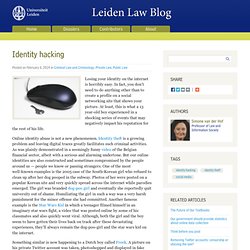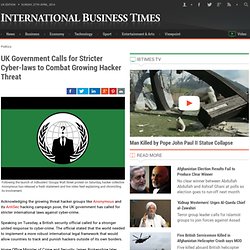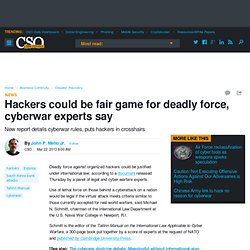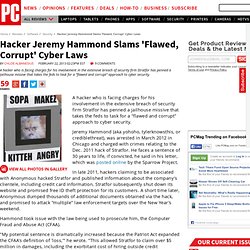

Election Hack: Stealing Votes the Cyber Way. How a student council candidate rigged his own election by stealing fellow students’ identities. A 22-year-old candidate for student council president at California State University San Marcos hoped to guarantee victory by rigging the election through cyber fraud, but he ended up winning a year in prison instead. Matthew Weaver used small electronic devices called keyloggers to steal the passwords and identities of nearly 750 fellow students. Then he cast votes for himself—and some of his friends on the ballot—using the stolen names. He was caught during the final hour of the election in March 2012 when network administrators noticed unusual voting activity associated with a single computer on campus. A Cal State police officer sent to investigate found Weaver working at that machine. Weaver installed keyloggers—inexpensive devices easily purchased on the Internet—on 19 different campus computers. Key slams 'juvenile' hacking by Anonymous - Politics News.
Published: 8:07AM Tuesday July 30, 2013 Source: ONE News/ Fairfax The hacking of more than a dozen National Party websites by opponents of the GCSB spying bill has been branded juvenile by the Prime Minister, whose site was among those disabled.

The sites were targeted by the New Zealand wing of the powerful global hacking group Anonymous overnight. Support Grows to Let Corporate Cybervictims Fight Back. Identity hacking - Leiden Law Blog. Losing your identity on the internet is horribly easy.

Skilled, Cheap Russian Hackers Power American Cybercrime. MOSCOW -- When it comes to finding original ways of virtually stealing real money, Russian criminals are in a class of their own.

With an estimated annual turnover of more than $2 billion a year, the Russian cybercrime industry is the source of at least a third of all viruses, Trojans and other malicious software, or malware, sent around the world. "In terms of sophisticated types of malware, Russia leads the way,” according to Kyle Wilhoit, an American cyber-security expert. As Hacking Hits Home, China Strengthens Cyber Laws. A year ago, when a Time Magazine reporter told Tan Dailin that he'd been identified as someone who may have hacked the Pentagon, he gasped and asked, "Will the FBI send special agents out to arrest me?

" The answer, it turns out, was, "No, the Chinese government will. " Dailin, better known in Chinese hacker circles as Withered Rose, was reportedly picked up last month in Chengdu, China, by local authorities. He is now facing seven years in prison under a new Chinese cybercrime law that was passed in late February. Although the Western media has been awash with stories of Chinese hacking for years, cybercrime was until recently governed by three articles added to China's criminal code in 1997. The laws were out-of-date and "failed to correlate proportionately with the tremendous social harm" caused by cybercrime, according to a recent paper on Chinese cyber-law published in the International Journal of Electronic Security and Digital Forensics.
UK Government Calls for Stricter Cyber-laws to Combat Growing Hacker Threat. Following the launch of Adbusters' Occupy Wall Street protest on Saturday, hacker collective Anonymous has released a fresh statement and live video feed explaining and chronicling its involvement.

Acknowledging the growing threat hacker groups like Anonymous and its AntiSec hacking campaign pose, the UK government has called for stricter international laws against cyber-crime. Speaking on Tuesday, a British security official called for a stronger united response to cyber-crime. The official stated that the world needed to implement a more robust international legal framework that would allow countries to track and punish hackers outside of its own borders. Home Office Minister of Crime and Security James Brokenshire later clarified to reporters at the launch of the International Cyber Security Protection Alliance (ICSPA), that the country would be looking to pool resources with other governments and companies in order to combat "scammers, fraudsters and hackers. " Hackers could be fair game for deadly force, cyberwar experts say. Deadly force against organized hackers could be justified under international law, according to a document released Thursday by a panel of legal and cyber warfare experts.

Use of lethal force on those behind a cyberattack on a nation would be legal if the virtual attack meets criteria similar to those currently accepted for real-world warfare, said Michael N. Schmitt, chairman of the International Law Department at the U.S. Naval War College in Newport, R.I. Hacker Jeremy Hammond Slams 'Flawed, Corrupt' Cyber Laws. A hacker who is facing charges for his involvement in the extensive breach of security firm Stratfor has penned a jailhouse missive that takes the feds to task for a "flawed and corrupt" approach to cyber security.

Jeremy Hammond (aka yohoho, tylerknowsthis, or crediblethreat), was arrested in March 2012 in Chicago and charged with crimes relating to the Dec. 2011 hack of Stratfor. He faces a sentence of 30 years to life, if convicted, he said in his letter, which was posted online by the Sparrow Project. In late 2011, hackers claiming to be associated with Anonymous hacked Stratfor and published information about the company's clientele, including credit card information. Stratfor subsequently shut down its website and promised free ID theft protection for its customers.
A short time later, Anonymous dumped thousands of additional documents obtained via the hack, and promised to attack "multiple" law enforcement targets over the New Year's weekend. Cyber-security: White hats to the rescue.